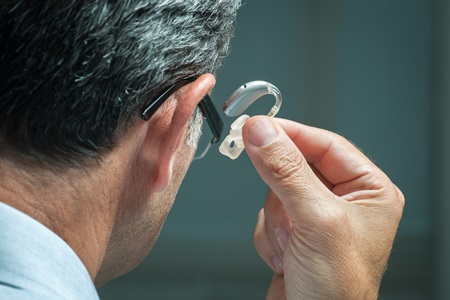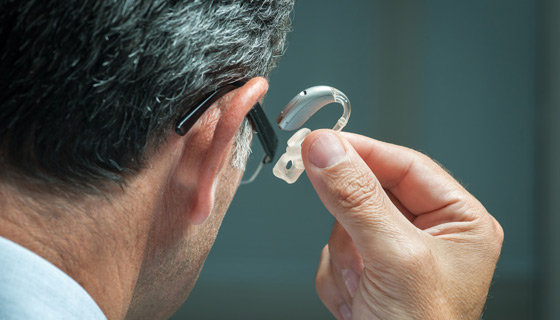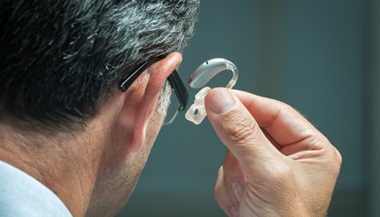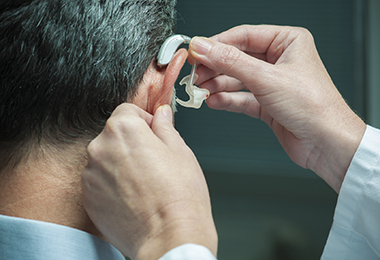The Hidden Risks of Hearing Loss
Hearing loss is frustrating for those who have it and for their loved ones. But recent research from Johns Hopkins reveals that it also is linked with walking problems, falls and even dementia.
In a study that tracked 639 adults for nearly 12 years, Johns Hopkins expert Frank Lin, M.D., Ph.D., and his colleagues found that mild hearing loss doubled dementia risk. Moderate loss tripled risk, and people with a severe hearing impairment were five times more likely to develop dementia.
The Links Between Hearing and Health
“Brain scans show us that hearing loss may contribute to a faster rate of atrophy in the brain,” Lin says. “Hearing loss also contributes to social isolation. You may not want to be with people as much, and when you are you may not engage in conversation as much. These factors may contribute to dementia.”
As you walk, your ears pick up subtle cues that help with balance. Hearing loss mutes these important signals, Lin notes. “It also makes your brain work harder just to process sound. This subconscious multitasking may interfere with some of the mental processing needed to walk safely.”
Research Shows Many Causes, Early Symptoms
Everything from genes and noise exposure to medications, head injuries and infections can play a role in hearing loss. Trouble detecting soft or high-pitched sounds is often the first sign that stereocilia — the delicate hair cells that convert sound waves into electrical signals within the ear — have been damaged. Soft sounds include phone conversations or background noise in settings such as restaurants. High-pitched sounds may include children’s voices. Ringing in the ears, called tinnitus, is another early signal of possible hearing loss.
Hearing Aid Myths That Hold You Back
Can hearing aids reduce these risks? Lin hopes to find out in a new study, still in the planning stages. “These studies have never been done before,” he notes. “What we do know is that there’s no downside to using hearing aids. They help most people who try them. And in those people, they can make all the difference in the world—allowing people to reengage with friends and family and to be more involved again.”
Although nearly 27 million Americans age 50 and older have hearing loss, only one in seven uses a hearing aid. If you think your hearing has diminished, it’s worth making an appointment with an audiologist for a hearing check, Lin says. If you have hearing loss, don’t let the following myths keep you from getting help.
“My hearing’s not that bad.”
Hearing aid users wait, on average, 10 years before getting help for hearing loss. But during that time, communication with loved ones becomes more difficult, and isolation and health risks increase. “Our findings emphasized just how important it is to be proactive in addressing any hearing declines over time,” says Lin.
“Wearing hearing aids means I’m old, and I’m not ready for that.”
It’s normal to feel worried that hearing loss means you’re aging—and to want to hide it. Plenty of people with a hearing impairment sit silently rather than joining in conversations and activities, because they fear that hearing problems will make them seem helpless or less than competent. The truth: Connecting with others can help your brain stay younger and keep you involved with life.
“I don’t like the way hearing aids look.”
Forget the old days of big, whistling earpieces. Today’s hearing aids and cochlear implants are smaller (and less conspicuous) than ever before. Even celebrities (like former president Bill Clinton and football Hall of Famer Mike Singletary) are wearing them proudly.
“I heard that hearing aids are difficult to use.”
There is a breaking-in period as you—and your central auditory system and brain—adjust to life with hearing aids. That’s why most doctors and hearing centers include a trial period, so you can be sure the type you’ve chosen—whether it’s a miniature behind-the-ear model or one that fits into your ear—is right for you.
Definitions
Social isolation: Loneliness that can affect health. People who are socially isolated have little day-to-day contact with others, have few fulfilling relationships and lack a sense of belonging. Social isolation can increase the risk for poor eating, smoking, alcohol use, lack of exercise, depression, dementia, poor sleep and heart disease.
Dementia (di-men-sha): A loss of brain function that can be caused by a variety of disorders affecting the brain. Symptoms include forgetfulness, impaired thinking and judgment, personality changes, agitation and loss of emotional control. Alzheimer’s disease, Huntington’s disease and inadequate blood flow to the brain can all cause dementia. Most types of dementia are irreversible.
Cochlear (koe-klee-er) implant: A device implanted into the inner ear to stimulate the auditory (hearing) nerve. It’s used to help restore sound perception in children and adults with profound hearing loss.
What You Need to Know Over-the-Counter Hearing Aids: Frequently Asked Questions

The Food and Drug Administration’s recent rule has expanded access to hearing aids by creating a new category of hearing aids: over-the-counter (OTC) hearing aids. Here are the answers to some of the most commonly asked questions about over-the-counter hearing aids.





